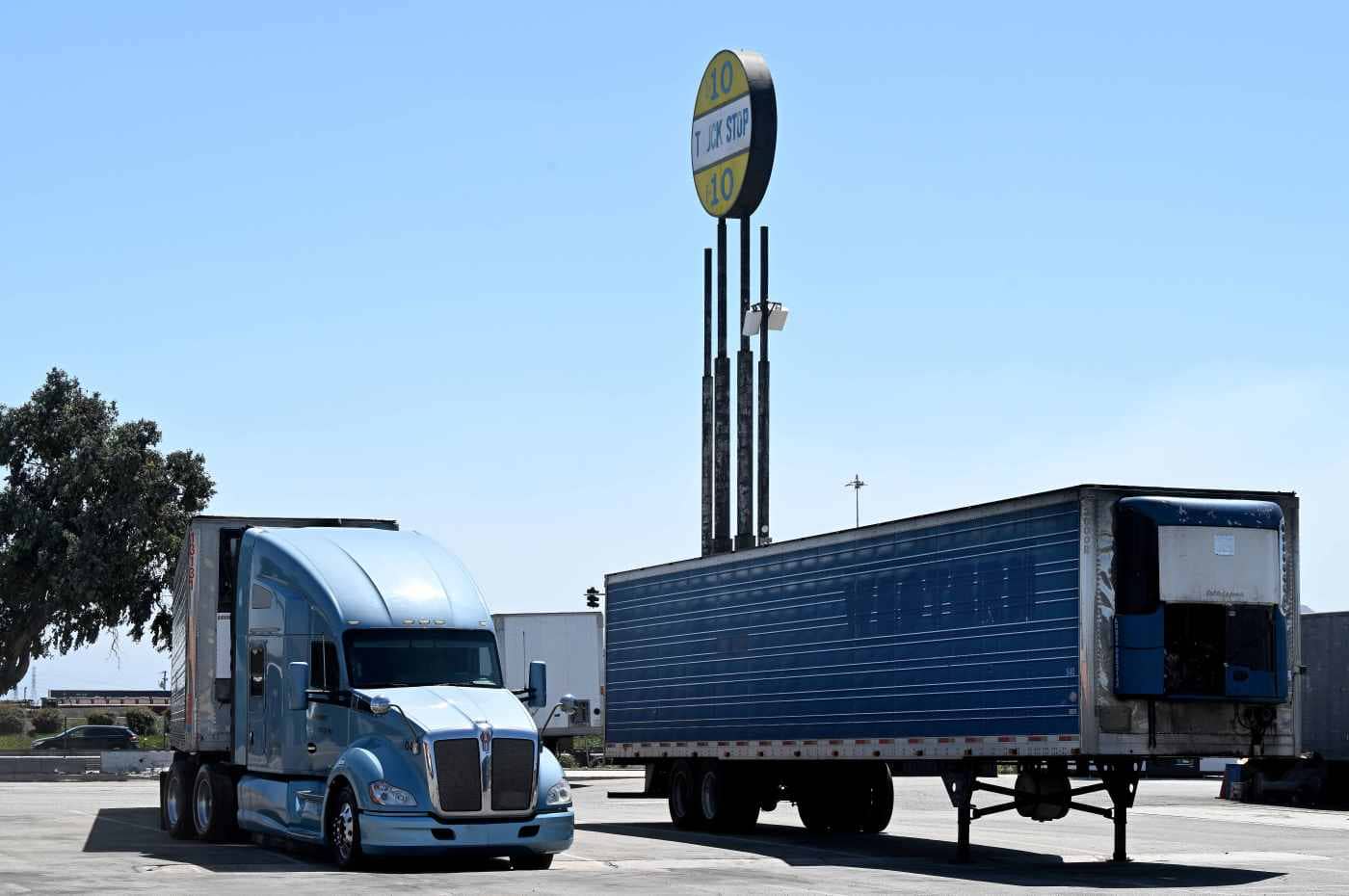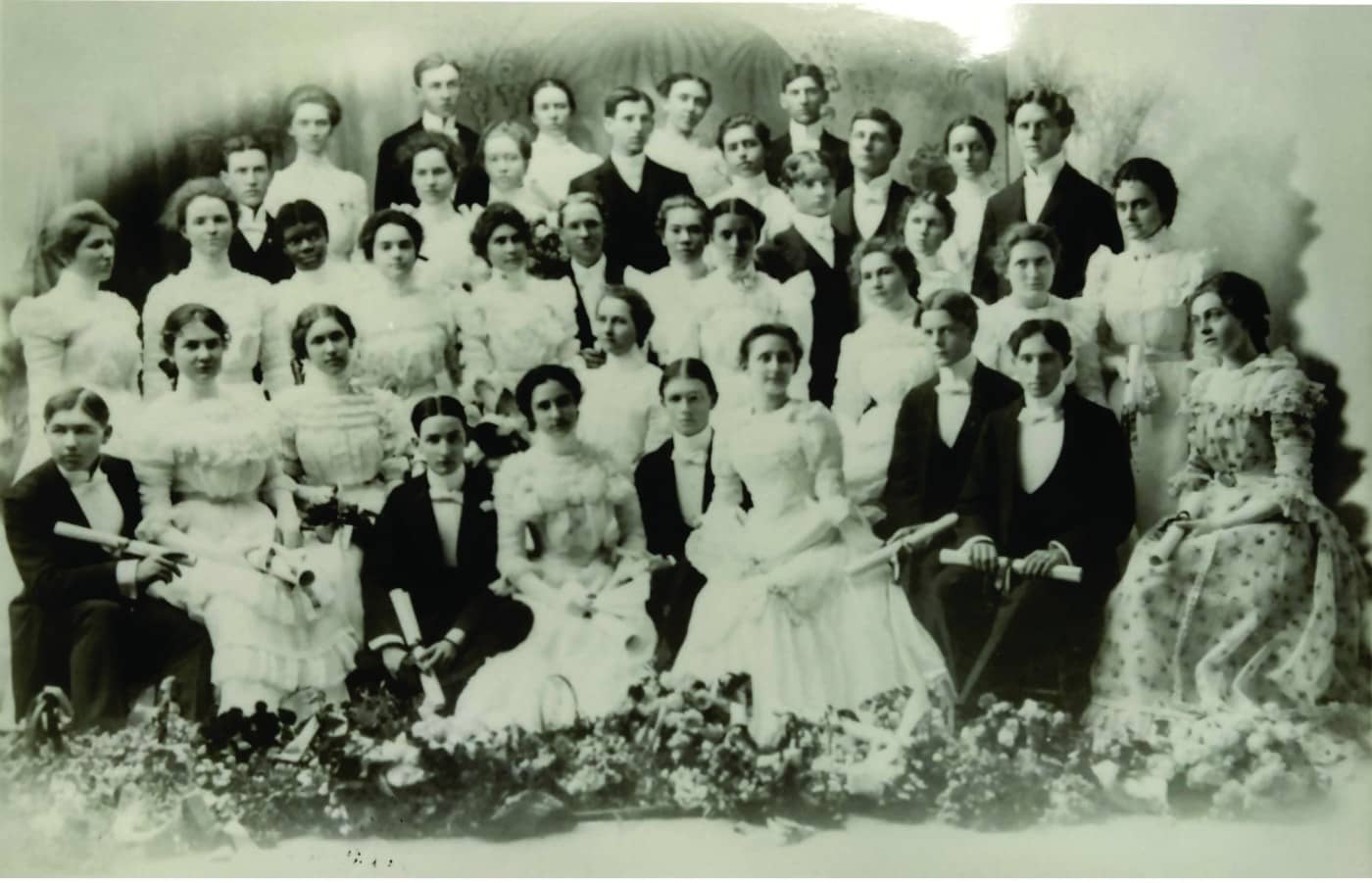One recent morning, Alonzo Huerta and Gabriel Padilla sat in their big rig enjoying homemade sandwiches while parked in an empty dirt lot in San Bernardino.
This simple task of taking a lunch break highlights a complex and growing problem in the city: the lack of parking spaces for big rigs.
RELATED: Semitruck drivers have a hard time finding parking in the Inland Empire
“You know, we truck drivers work all day long, sometimes 24-hour shifts, so circling the city for an extra hour looking for a space to park when I should already be on break or ending my shift is something I just shouldn’t have to deal with,” said Huerta, a San Bernardino semi-truck driver who was parked off Medical Center Drive.
The issue could worsen as the Inland Empire witnesses a surge in new warehouses and logistics centers, largely due to a shift to online shopping habits, plenty of available land and residents eager to take jobs in logistics. It’s become common to see 18-wheelers transporting loads around San Bernardino and other Inland Empire cities.
To cope with San Bernardino’s truck parking lot shortage, some entrepreneurs have bought lots for overnight truck parking.
One such proposal went to the San Bernardino City Council on Wednesday, Aug. 21, and won approval on a 4-1 vote. The decision paved the way for a 53-space truck parking facility on an empty lot at the southeast corner of Rancho and Rialto avenues.
At the meeting, some residents criticized the proliferation of trucks in their city, but not all share that view.
San Bernardino resident Aliyah Myles, who lives in a neighborhood near Medical Center Drive, said in an interview that she feels for truckers.
“I get that they are these big, noisy vehicles that no one wants in their neighborhood, but inside that truck is a person,” Myles said. “Everyone deserves to rest after work.”
In San Bernardino and beyond, big rig drivers who struggle to park their massive vehicles frequently park on freeway shoulders, in abandoned lots or in other residential areas when taking their federally mandated breaks after 10 hours behind the wheel.
Trevor Lyman, a big rig driver in the city, has accepted the reality.
“Sleeping overnight in dangerous areas is just part of the job,” when there is nowhere to park and rest, he said.
The issue has led to makeshift parking lots to meet the demand, San Bernardino spokesperson Jeff Krauss said. To qualify as a legal lot, owners need a development permit, a paved lot and to create little disturbance to nearby properties, he said.
Shamsher Harika, a 34-year-old Fontana resident and truck driver, is among those who tried to provide big rig parking.
In May 2022, Harika opened an overnight truck lot in San Bernardino. But in October 2023, the city shut it down, issuing 79 parking citations — one for each truck parked on his property.
City officials did so because his lot on Medical Center Drive lacked the necessary permits, Krauss said. Harika’s lot is no longer operating and now empty of vehicles. Harika said he plans to pave his lot and is working with the city to get the proper permits, despite the procedure “being a very lengthy and costly process.”
In addition to the red tape, truck drivers face other challenges, Harika said.
“We cannot park on the street or shoulders or we will be ticketed, and the local truck stops are overcrowded, with some charging up to $50 per night to park, which I believe is robbery.”
The city has no truck stops, but neighboring Colton and nearby Rialto have facilities run by Pilot Travel Centers that offer game rooms, showers, restaurants, laundry facilities and truck washes.
Pilot Travel Centers see drivers from across the country, Rishi Prasad, regional manager at Pilot Company, said, adding that the “Rialto and Colton locations sees a high volume of freight transportation.”
Pilot and Flying J travel centers offer “prime” parking spaces for those with reservations and public spaces that are available on a first-come, first-served, basis, Prasad said in an email.
Still, the centers cannot fill the void.
Residents who live close to freeways, like Jonathan Castillos, who is near the 215 freeway, have expressed concerns about trucks parking near their neighborhood.
“The noises these semis make will wake us up in the middle of the night,” Castillos said.
“I feel bad for the drivers, cause I get they’re only trying to make a living,” he said. “But at the same time, it’s affecting my 4-year-old son’s sleep at night, so I’d like to see something be done soon.”
In San Bernardino, residents’ major complaint is about trucks parked near schools and neighborhoods, said Kimberly Calvin, the city’s Ward 6 city councilmember whose district includes Harika’s lot.
“We’re a huge logistics city, because we rely on goods to be carried from one point to another, but that doesn’t mean these trucks need to be in my backyard,” Calvin said.
San Bernardino code enforcement officers are addressing residents’ complaints about illegal truck parking by citing violators, Krauss said.
“For many years, code enforcement was significantly understaffed … we have recently gone from six officers to 20 and are now able to address quality-of-life issues such as illegal truck parking,” he said.
In addition, Krauss said the San Bernardino Police Department recently created a commercial truck traffic enforcement team to tackle illegal street parking and truck traffic on unpermitted streets.
Related links
Why do semi trucks keep parking on residential streets in Riverside County?
Semitruck drivers have a hard time finding parking in the Inland Empire
Can big trucks legally park on Riverside’s residential streets?
Calvin said the solution is to develop a plan outlining designated areas where truck drivers can park. She also suggested that pollution concerns could be alleviated if more trucks were converted to hybrid vehicles.
The new lot, which will have spaces for trucks and truck trailers, is needed to help alleviate the city’s truck parking shortage, said Ricardo Pozos, associate planner for Somos Group, which is overseeing the project approved Wednesday.
In overturning the city planning commission’s earlier rejection of the project, councilmembers put two requirements on the lot. It must have electric truck chargers for hybrid trucks and roads must be maintained to guard against pavement cracks and deterioration.
Meanwhile, truckers like Padilla, the driver who was on his lunch break, hope for a resolution as well.
“People want their goods delivered but they don’t know what we go through,” the San Bernardino resident said. “Expensive citations, sleeping overnight in a risky areas, long shifts with nowhere to park and rest. “I still love driving my truck, but the unnecessary hassles that come with the job is what I wish more people would acknowledge and do something about.”



